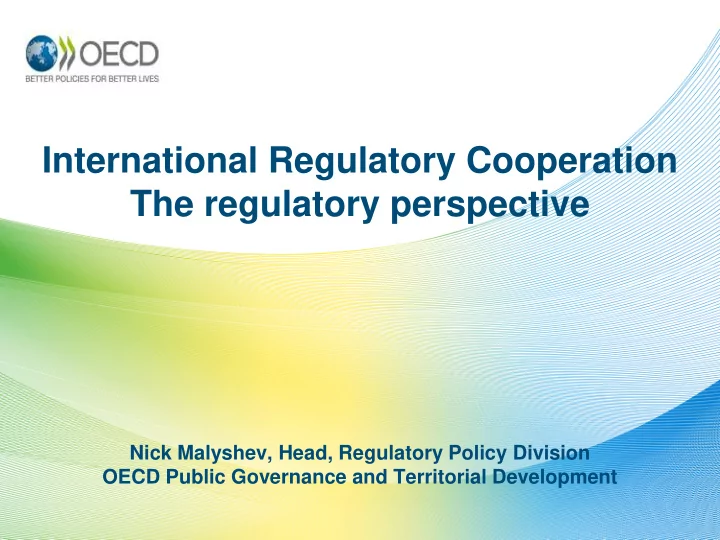

International Regulatory Cooperation The regulatory perspective Nick Malyshev, Head, Regulatory Policy Division OECD Public Governance and Territorial Development
IRC: a long standing concern of regulators OECD (1994), Regulatory Co-operation for an Interdependent World Point 12 of the 2012 Recommendation on Regulatory Policy and Governance : “ In developing regulatory measures, give consideration to all relevant international standards and frameworks for co-operation in the same field and, where appropriate, their likely effects on parties outside the jurisdiction ” OECD (2013), International Regulatory Co-operation: Addressing Global Challenges : systematic stock taking of IRC practices across OECD countries based on a survey & 10 case studies
Why cooperate? Effectiveness : To manage global goods, bads • and risks; and avoid the regulatory failures of the past Economic efficiency : To boost growth through • reducing costs and burdens on economic activities • Administrative efficiency : To share work and be more efficient at achieving policy objectives There are trade opportunities from IRC in reducing behind the borders barriers, and opportunities to lock in good regulatory practices and IRC from trade deals. IRC has broader objectives than the trade agenda.
Main highlights • Evidence shows growing IRC. However, approaches to IRC remain ad hoc & the world of IRC is highly fragmented. • There is a wide range of IRC approaches. Harmonisation is not the solution in all sectors and country context. • Regulatory frictions to trade often arise from enforcement. Focusing efforts on design of rules is not enough. • Addressing the ‘stock’ of regulations is equally important to anticipating on new regulatory measures. • Regulatory policy has a role to play but achieving greater regulatory coherence also requires more active approaches • Multiplication of state and non-state regulatory actors
Proposed classification Costs and Benefits challenges Costs of additional Economic gains layer of coordination Managing risks and Specificity of externalities across regulatory set up borders Greater administrative Political economy of cooperation efficiency Implementation Knowledge flow challenges
On-going work • Deepening of the IRC typology by documenting benefits / costs of various IRC mechanisms (MRAs, GRP, IOs, international standards). • Analytical work on the trade costs of regulatory divergences and impacts of IRC. Instruments & opportunities for regulatory cooperation in the context of trade policy (GOV & TAD) • Greater understanding & best practices on rule making & regulatory management practices of IOs (GOV & LEG) Ultimately: Support implementation of Principle 12 of the OECD Recommendation on Regulatory Policy and Governance
Thank you Contact : Nick Malyshev , nikolai.malyshev@oecd.org www.oecd.org/gov/regulatory-policy/irc.htm
Recommend
More recommend